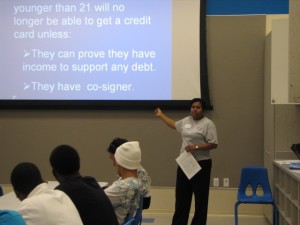Shay Olivarria is a financial education speaker, former newspaper columnist, former foster youth and author of All My Mistakes: Money lessons for emancipating youth, 10 Things College Students Need to Know About Money and Money Matters: The Get It Done in 1 Minute Workbook. She teaches personal finance to youth in foster care through her company, Bigger Than Your Block. Shay began life with a “super smart” mother who exposed her to diverse cultures, free community programs, and good schools. Her mother wanted her to experience the best things in life and instilled in her the desire and confidence to go to college. Shay was removed from her home because of her mother’s noncompliance with a treatment plan. She spent four years in the foster care system.
Shay describes the emotional trauma of being separated from her family as “going from the frying pan into the fire”. Shay was held in a detention center where there was one teacher for an entire wing of students ages 11-18. As a result, she had to attend summer school to make up the academic skills lost in an environment where there was no learning taking place. She was then placed in three foster homes within one year. She ran away from the last foster home because she was not being fed. Although she had run away, Shay never missed a day of school. It was at her school where her social worker found her and placed her in kinship care with her maternal grandmother.
There were limits on the amount of income that a child in foster care could earn and for this reason Shay’s social worker discouraged her from working. Shay found a job and moved out of her grandmother’s home without informing social services. At seventeen she aged out of foster care, graduated from high school, got a low-paying job, and didn’t save any of her earnings.
Shay believes it is important for youth in care to see and interact with alumni that can help guide them. According to Shay, there are two things we need to understand about children in foster care: (1) They didn’t do anything wrong; and (2) they are no different than the average population in terms of developing protective individual coping mechanisms and being a part of families with their own level of dysfunction.
Foster care made Shay feel alone. For four years Shay was living with strangers in their homes without many of her personal belongings. Some of the foster families she was placed with were nice but they were not her family. Often times the families already had biological children whom they treated differently. In the foster care system, access to resources can be minimal and youth aren’t always supported in the way they need it most. For many youth in care, trauma and disappointment are never fully addressed because they receive ineffective therapy or no therapy at all. Shay believed in herself and understood that she could create the life for herself that she wanted. She set goals and put in the work to achieve them knowing full well that she didn’t “need permission to be someone” and that no one was coming to rescue her. Although faith in herself and her abilities was instilled in her by her biological family, Shay believes that this is not the norm and many children in foster care have low self-esteem and are used to getting knocked down and bulled over.
Too many kids emancipate or age out and are unable to find a job that supports them, are unable to find a place to live, and unable to use simple personal finance concepts to start building wealth. Shay believes that honesty is essential to changing the trajectory for youth in care because so many don’t have a familial “cushion” to fall back on when things get tough. Sometimes just being able to sit and talk with someone who has been where you have been is immensely helpful. It is for these reasons that Shay partners with organizations that work with kids in foster care to help prepare the youth to emancipate successfully. Shay is also in the process of adopting from foster care.
Shay always knew that she wanted to be an entrepreneur but she was unsure of what business she would start. While running youth programs (truancy and afterschool) in Philadelphia she realized that many people, teens especially, had similar feelings about personal finance. Shay redesigned the curriculum for an after school and truancy program in Philadelphia where she worked. The old curriculum was not reaching the youth or making a positive impact on their behavior. Bigger Than Your Block was birthed a few years later. Shay became an author because she wanted to share her knowledge with people who may be unable to afford her speaking fees. Her books are thin and easy to read and include all the financial mistakes she has made as well as the things she discovered through trial and error because she had not been taught. Her books lay the groundwork for mastery of essential financial life skills. They provide simple strategies that can be easily understood and implemented.
When asked what we (society) can do to support teens girls in foster care, Shay replied we need to introduce them to (professional) soft skills and hard skills. Adults need to teach them about sending thank you cards after interviews and share the benefits of opening up a retirement account with them. We can also no longer wait until they are fifteen or sixteen to send youth independent living/ life skills classes. We have to start teaching these skills as soon as possible.
Shay believes in the strength and potential of all young people. We are grateful that she uses her life to provide a clear road map of how to set youth in care up for success.
As we host our 6th Annual Pack A Purse Drive™ in December 2012, we will use the Teen Toolbox blog as a platform to spread inspiration and hope by highlighting the triumphs of successful women foster care alumni.
Nicki Sanders, MSW, Chief Visionary Officer
The Teen Toolbox provides youth portfolio development and civic engagement and academic empowerment strategies to help teens set goals for life after high school and create a road map to reach those goals through its PACKAGED FOR SUCCESS™ Programs. We are committed to supporting and raising awareness about the needs and potential of teenagers in the foster care system.

